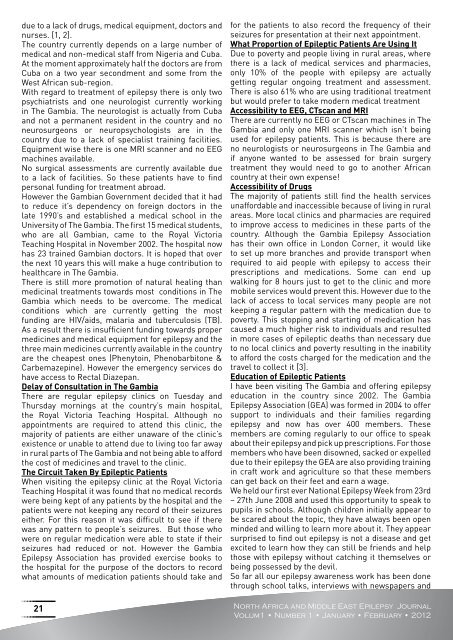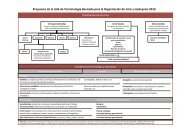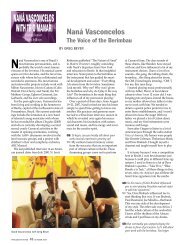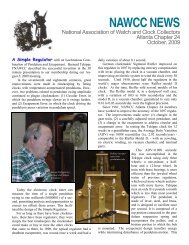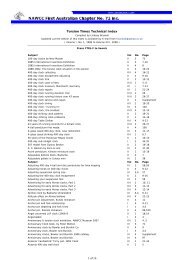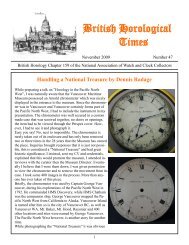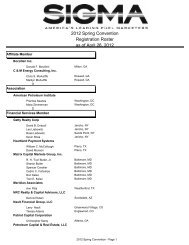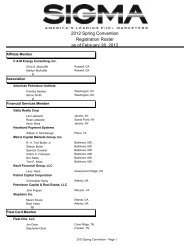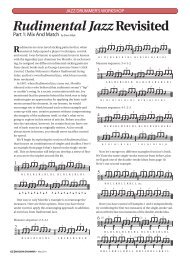Neurologist, Morocco - Amazon Web Services
Neurologist, Morocco - Amazon Web Services
Neurologist, Morocco - Amazon Web Services
Create successful ePaper yourself
Turn your PDF publications into a flip-book with our unique Google optimized e-Paper software.
due to a lack of drugs, medical equipment, doctors and<br />
nurses. [1, 2].<br />
The country currently depends on a large number of<br />
medical and non-medical staff from Nigeria and Cuba.<br />
At the moment approximately half the doctors are from<br />
Cuba on a two year secondment and some from the<br />
West African sub-region.<br />
With regard to treatment of epilepsy there is only two<br />
psychiatrists and one neurologist currently working<br />
in The Gambia. The neurologist is actually from Cuba<br />
and not a permanent resident in the country and no<br />
neurosurgeons or neuropsychologists are in the<br />
country due to a lack of specialist training facilities.<br />
Equipment wise there is one MRI scanner and no EEG<br />
machines available.<br />
No surgical assessments are currently available due<br />
to a lack of facilities. So these patients have to find<br />
personal funding for treatment abroad.<br />
However the Gambian Government decided that it had<br />
to reduce it’s dependency on foreign doctors in the<br />
late 1990’s and established a medical school in the<br />
University of The Gambia. The first 15 medical students,<br />
who are all Gambian, came to the Royal Victoria<br />
Teaching Hospital in November 2002. The hospital now<br />
has 23 trained Gambian doctors. It is hoped that over<br />
the next 10 years this will make a huge contribution to<br />
healthcare in The Gambia.<br />
There is still more promotion of natural healing than<br />
medicinal treatments towards most conditions in The<br />
Gambia which needs to be overcome. The medical<br />
conditions which are currently getting the most<br />
funding are HIV/aids, malaria and tuberculosis (TB).<br />
As a result there is insufficient funding towards proper<br />
medicines and medical equipment for epilepsy and the<br />
three main medicines currently available in the country<br />
are the cheapest ones (Phenytoin, Phenobarbitone &<br />
Carbemazepine). However the emergency services do<br />
have access to Rectal Diazepan.<br />
Delay of Consultation in The Gambia<br />
There are regular epilepsy clinics on Tuesday and<br />
Thursday mornings at the country’s main hospital,<br />
the Royal Victoria Teaching Hospital. Although no<br />
appointments are required to attend this clinic, the<br />
majority of patients are either unaware of the clinic’s<br />
existence or unable to attend due to living too far away<br />
in rural parts of The Gambia and not being able to afford<br />
the cost of medicines and travel to the clinic.<br />
The Circuit Taken By Epileptic Patients<br />
When visiting the epilepsy clinic at the Royal Victoria<br />
Teaching Hospital it was found that no medical records<br />
were being kept of any patients by the hospital and the<br />
patients were not keeping any record of their seizures<br />
either. For this reason it was difficult to see if there<br />
was any pattern to people’s seizures. But those who<br />
were on regular medication were able to state if their<br />
seizures had reduced or not. However the Gambia<br />
Epilepsy Association has provided exercise books to<br />
the hospital for the purpose of the doctors to record<br />
what amounts of medication patients should take and<br />
21<br />
for the patients to also record the frequency of their<br />
seizures for presentation at their next appointment.<br />
What Proportion of Epileptic Patients Are Using It<br />
Due to poverty and people living in rural areas, where<br />
there is a lack of medical services and pharmacies,<br />
only 10% of the people with epilepsy are actually<br />
getting regular ongoing treatment and assessment.<br />
There is also 61% who are using traditional treatment<br />
but would prefer to take modern medical treatment<br />
Accessibility to EEG, CTscan and MRI<br />
There are currently no EEG or CTscan machines in The<br />
Gambia and only one MRI scanner which isn’t being<br />
used for epilepsy patients. This is because there are<br />
no neurologists or neurosurgeons in The Gambia and<br />
if anyone wanted to be assessed for brain surgery<br />
treatment they would need to go to another African<br />
country at their own expense!<br />
Accessibility of Drugs<br />
The majority of patients still find the health services<br />
unaffordable and inaccessible because of living in rural<br />
areas. More local clinics and pharmacies are required<br />
to improve access to medicines in these parts of the<br />
country. Although the Gambia Epilepsy Association<br />
has their own office in London Corner, it would like<br />
to set up more branches and provide transport when<br />
required to aid people with epilepsy to access their<br />
prescriptions and medications. Some can end up<br />
walking for 8 hours just to get to the clinic and more<br />
mobile services would prevent this. However due to the<br />
lack of access to local services many people are not<br />
keeping a regular pattern with the medication due to<br />
poverty. This stopping and starting of medication has<br />
caused a much higher risk to individuals and resulted<br />
in more cases of epileptic deaths than necessary due<br />
to no local clinics and poverty resulting in the inability<br />
to afford the costs charged for the medication and the<br />
travel to collect it [3].<br />
Education of Epileptic Patients<br />
I have been visiting The Gambia and offering epilepsy<br />
education in the country since 2002. The Gambia<br />
Epilepsy Association (GEA) was formed in 2004 to offer<br />
support to individuals and their families regarding<br />
epilepsy and now has over 400 members. These<br />
members are coming regularly to our office to speak<br />
about their epilepsy and pick up prescriptions. For those<br />
members who have been disowned, sacked or expelled<br />
due to their epilepsy the GEA are also providing training<br />
in craft work and agriculture so that these members<br />
can get back on their feet and earn a wage.<br />
We held our first ever National Epilepsy Week from 23rd<br />
– 27th June 2008 and used this opportunity to speak to<br />
pupils in schools. Although children initially appear to<br />
be scared about the topic, they have always been open<br />
minded and willing to learn more about it. They appear<br />
surprised to find out epilepsy is not a disease and get<br />
excited to learn how they can still be friends and help<br />
those with epilepsy without catching it themselves or<br />
being possessed by the devil.<br />
So far all our epilepsy awareness work has been done<br />
through school talks, interviews with newspapers and<br />
North Africa and Middle East Epilepsy Journal<br />
Volum1 • Number 1 • January • February • 2012


